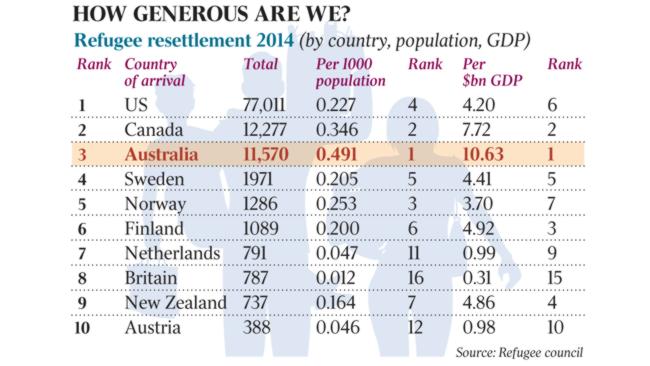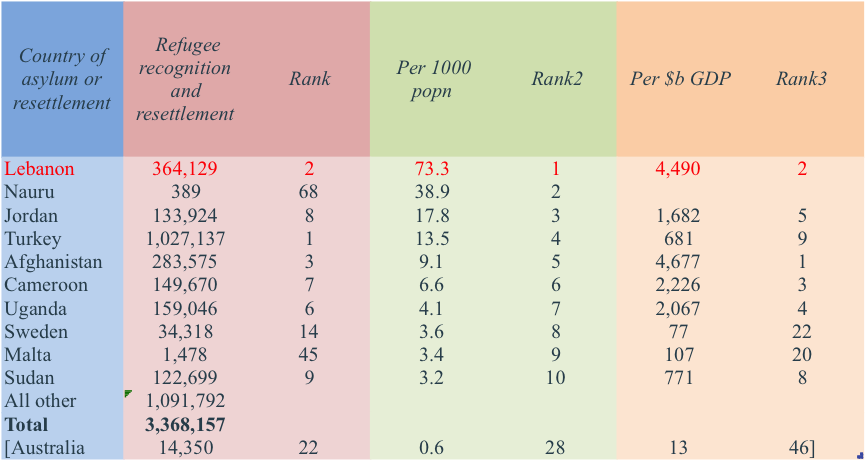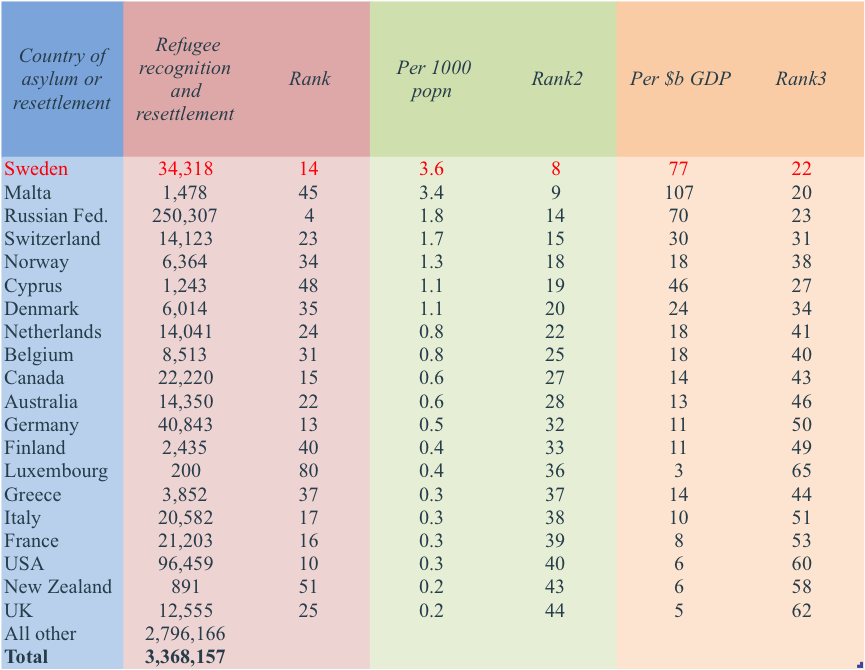Australia, readers of The Australian have learned, is well and truly ‘pulling its weight on refugees’. Australia is said to be the most generous receiver of refugees in the world. What authority is cited? Why, the Refugee Council of Australia. The newspaper has simply taken the Refugee Council’s statistics on refugee resettlement in 2014, which were released at the end of July, and helpfully displayed them thus:
As you can see, right there in red, Australia ranked first in the world as a refugee resettler in 2014, whether measured in terms of refugees resettled per head of recipient country population, or in comparison with recipient country GDP.
Impressive? No. Breathtakingly selective and disingenuous reporting? That’s more like it.
In releasing the 2014 numbers, the Refugee Council stated very clearly that, ‘the fairest comparison is to look at how the refugee recognition and resettlement within Australia’s total Refugee and Humanitarian Program compares on a global basis’ (emphasis added). The ‘recognition’ part makes all the difference. In the overwhelming majority of cases—97 per cent in 2014—refugees acquire that status by arriving somewhere as an asylum seeker and subsequently being recognized domestically as a refugee. The statistics quoted by The Australian relate only to the comparatively miniscule number of cases—just over 100,000 out of 3.4 million in 2014—in which refugees are recognized offshore and then resettled in developed countries.
The Refugee Council itself decidedly does not make a point of saying Australia ranks first or even highly on any meaningful measure of generosity as a refugee-receiving nation. In fact, in drawing what it considers the fairest comparison, as outlined above, it says:
By this measure [recognition plus resettlement], the 14,350 refugees recognised or resettled in Australia during 2014 made up 0.43% of the global total, with Australia ranked 22nd overall, 27th on a per capita basis [actually 28th] and 46th relative to total national GDP. The 2014 statistics are similar to those of the previous decade. In the 10 years to 31 December 2014, the 141,047 refugees recognised or resettled by Australia accounted 1.16% of the global total of 12,107,623 – with Australia ranked 23rd overall, 27th per capita and 46th relative to national GDP.
So which countries were in fact the most generous refugee-receiving nations on a per capita basis in 2014? On the basis of the statistics released by the Refugee Council, which in turn were got from the UN Refugee Agency (UNHCR), the top seven in the generosity rankings were of course developing countries including, coincidentally, Australia’s diminutive neighbour Nauru. Sweden and Malta are the only developed countries that figure in the top 10.
Refugee recognition and resettlement, 2014
If, for any reason, you are interested in comparisons only between Australia and other developed countries for 2014, the situation is as shown below.
Australia is with Canada in the middle of the developed-country pack. Those toward the top of the pack, even if we leave aside the exceptional cases of Sweden and Malta, are settling two to three times as many refugees per head of population as Australia and Canada.
Somebody at The Australian had to burn a few calories in undertaking the statistical manipulation described above, which involved constructing a new and meaningless country ranking based only on refugees resettled and ignoring asylum seekers recognized as refugees. Let it not be thought that the Refugee Council of Australia, let alone UNHCR, actually did this themselves.





Hello there,
I am a Liberian living here in the United States. I am very interested in the issue of refugees around the world as I was once a refugee myself. In any case the life of these people has been changed forever either for better or worse. Policy makers need to be educated about the plight of these folks here and interestingly so we are talking about human beings. Indeed it is because of education that the developed world protects even animals and people who do not respect their right to live get into trouble.
Life is very precious indeed. The other thing I want to say is what is causing the refugee out flow world wide in the first place needs urgent attention by all peace loving nations. Until we all collectively find a solution to this, we will never solve the refugee crisis. Hold your government accountable when they deal with failed states and do not care about the citizens of those countries, our companies make deals that our laws will not allow and a whole bunch of stuffs.
Our governments must be transparent in whatever ways they deal with these countries and live by example otherwise get ready to deal with refugee crisis year in and year out. There is frustration but lets hold our governments accountable to begin with and things may not be as difficult as they are today.
It depends on what you measure. Other countries allow refugees to enter, but they don’t give them citizenship or anything more than subsistence. They let them stay in a tent with hundreds of thousands of other refugees, but don’t allow them to leave the camp. On that measure, Australia ranks last because it doesn’t have any tent city refugee camps (unless you count Nauru and Manus, which perhaps you should). Turkey, Pakistan, Jordan, Lebanon, Syria and Iran have vastly more refugees in camps, in areas that can be reached by foot from war zones.
On the measure of resettling, which means granting full citizenship, Australia consistently ranks first or second with Canada.
Saudi Arabia ranks last on formal recognition of refugees, but it provides hundreds of thousands of jobs to Syrians in Saudi Arabia.
Australia could do more, and reaching #1 for refugee tent city refugee camps may even be achievable if desert acreage is the only requirement, but is that the best we could do?
What is the best Australia could do? I’d like to see RCA advocate that, in a way that brings a significant majority of Australians along with it. Australians don’t like to be told they are not compassionate or that they are mean or that they are not pulling their weight. To achieve popular support, RCA will need to clarify its objectives, calculate achievable outcomes, and advocate a plan of action in a positive way that most Australians can embrace. A lot of Australians are waiting for just that.
Yes, the general message of the post above is very much, ‘it depends on what you measure’.
However, the more specific messages are that (a) ‘refugees resettled per head of population’ is a practically irrelevant measure, and (b) it is highly misleading to claim, as various members of the government are now claiming on a daily basis, that Australia ‘takes in’ more refugees per head of population than any other country, without specifying that this statement relates to a particular way of taking in a very small proportion of the world’s refugees. If your country is swamped with asylum seekers, you take some of them in via recognition, and you probably don’t bother running a resettlement program.
I would think that the Refugee Council of Australia does see itself as doing the things set out in your penultimate sentence but I don’t speak for them. More importantly, one might as well say, ‘To achieve popular support, the Australian government will need to clarify its objectives, calculate achievable outcomes, and advocate a plan of action in a positive way that most Australians can embrace. A lot of Australians are waiting for just that.’
I think there might be some distance between increasing Australia’s humanitarian intake and building tent cities.
Thanks Robin for an excellent piece of analysis.
The frustration continues today with The Australian printing a heavily edited (without consultation) letter to the editor.
For the record here is what Refugee Council of Australia CEO, Paul Power actually wrote in response to their misrepresentation of our analysis.
“Dear Editor,
It’s disappointing that The Australian misrepresents the Refugee Council of Australia’s analysis of global refugee statistics. Few people outside of Australia would accept the assertion that our nation’s response to refugees was the most generous per capita in 2014 (The Australian 8 August, 2015 Australia pulling its weight on refugees).
To compare Australia’s Refugee and Humanitarian Program, we need to look at both components of the program – the issuing of permanent protection visas to refugees recognised through the asylum process and the resettlement of refugees from other countries.
In the 2014 calendar year, UNHCR statistics show that Australia recognised 2,780 refugees through its asylum process and resettled 11,570 refugees from other countries, assisting 14,350 refugees in all.
Around the world, 3,262,960 people were recognised as refugees through asylum processes and 105,197 were resettled, a total of 3,368,157.
By this measure, Australia assisted 0.43% of the refugees recognised or resettled in 2014. It was ranked 22nd overall, 28th per capita and 46th relative to total GDP.
Lebanon’s recognition of 364,129 refugees was 120 times greater on a per capita basis than Australia’s total response.
Of the countries which typically grant permanent residency to recognised and resettled refugees, Sweden’s per capita response was 5.8 times greater than Australia’s, with 32,347 refugees recognised and 1,971 resettled.
No amount of selective use of statistics will hide the fact that the Australian Government cut its refugee program by one third in 2013 while the world’s displacement crisis was growing to its highest level in 70 years.
Paul Power
Chief Executive Officer
Refugee Council of Australia”
With the media clearly lining up on one side of a debate, the rigor of our academic institutions is needed more than ever.
Your efforts are greatly appreciated.
Tim O’Connor
Communications Director
Refugee Council of Australia
Dear Tim/Paul,
I agree whole heartedly Australia could and should be doing more.
But aren’t you being a little bit disingenuous quoting statistics about how many refugees have been recognised by Lebanon for example..for what does it really mean for them to be recognised? will they gain citizenship, access to health care and welfare, as in Australia? and the huge numbers now in Lebanon are clearly a result of the conflict in Syria….so how many refugees per year and per head of population have Lebanon resettled over the ten years before the current crisis? That would be a more appropriate comparison. If you look at the UNHCR website, and remove the Syrian numbers, there are less than 10,000 refugees from other countries recognised in Lebanon, and the increase between Jan 15 and Dec 15 is projected to be 300 people. Do you point out that the Lebanese government has donated a grand total of $73,000 to the UNHCR in the last 10 years, whilst the Australian government has donated $350 million; or that Lebanese private donations to the UNHCR in the last 9 years has been $100,000 whilst Australian private donations have been $85 million??
So I think you are being just as disingenuous as you claim the Australian newspaper is, when bald statements like that about Lebanon’s recognition per capita being 120 x that of Australia are made. You show no more rigor, and are just as happy to mislead for your own purposes